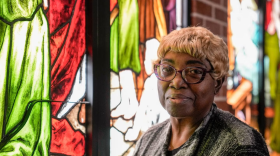Soon, most new residential construction in Baltimore City may be required to have at least 10% of its units set aside for lower income Baltimoreans.
On Monday night, the Baltimore City Council advanced its inclusionary housing legislation while narrowly voting against an amendment that would have capped tax credits for the policy.
That amendment, put forth by Councilmember James Torrence (D-7), would have stopped the tax credit after 350 affordable units were constructed– effectively ending the policy.
Outside of City Hall before the vote, President Nick Mosby led advocates in a chant crying, “No cap! No cap!”
“We don't have caps on other financial benefits in the centers. And we shouldn't have tax credits on the backs of taxpayers who've been paying for far too long, and have not been included in communities that are growing,” said Mosby.
Baltimore’s inclusionary housing policy consists of two bills, crafted and sponsored by Councilmember Odette Ramos (D-14,) that are making their ways through the council. The first, which was amended slightly on Monday, requires market rate residential developments of more than 20 units to have at least 10% of units available for affordable housing. That applies if the developer already receives or plans to receive a “major” public subsidy. For the 10% of set aside units, 5% are reserved for people making less than 50% of the area median income (AMI) and the other 5% for people making less than 60% of AMI. Currently, in Baltimore that works out to an annual income of $60,850 and $67,000, respectively, for a household of four people
The complementary bill is a tax credit that would make up the difference for developers between the market rate and rent collected on the reduced price units. Had Torrence’s amendment gone through, it would have capped that at 350 units. The amendment lost 6-7 with one councilmember abstaining.
Torrence, who voted to advance the inclusionary housing bill, said he made the decision after talking with Mayor Scott’s administration and developers about concerns over the policy’s affordability.
“There are other ways in which we can pay for affordable inclusionary housing,” said Torrence.
Advocates of inclusionary housing argue that the policy advances equity by allowing lower-income people to live in areas where development and services are thriving rather than areas that still struggle with systemic neglect. In Baltimore specifically, it is seen as a tool to fight back against redlining and years of systemic disinvestment.
In a hearing last week, Mayor Brandon Scott’s administration urged the council to slow down on the bills, citing concerns about the financial impact on the city. Before Monday night’s vote though, the mayor attended the rally beside Ramos and Mosby to stand in support of the inclusionary housing policies.
“My administration wholeheartedly supports the vision of inclusive and affordable housing here in the city of Baltimore, and laying the framework to prioritize inclusionary housing plays an important role in advancing that vision,” said Scott, while adding that he thinks there are still many conversations that need to be had to make the bill “operational.”
On Monday night the council voted on an amendment that would trigger a study after the first 200 units are built and occupied to assess the policy’s efficacy.
The bills still need to make it through one more council vote before they become law.






